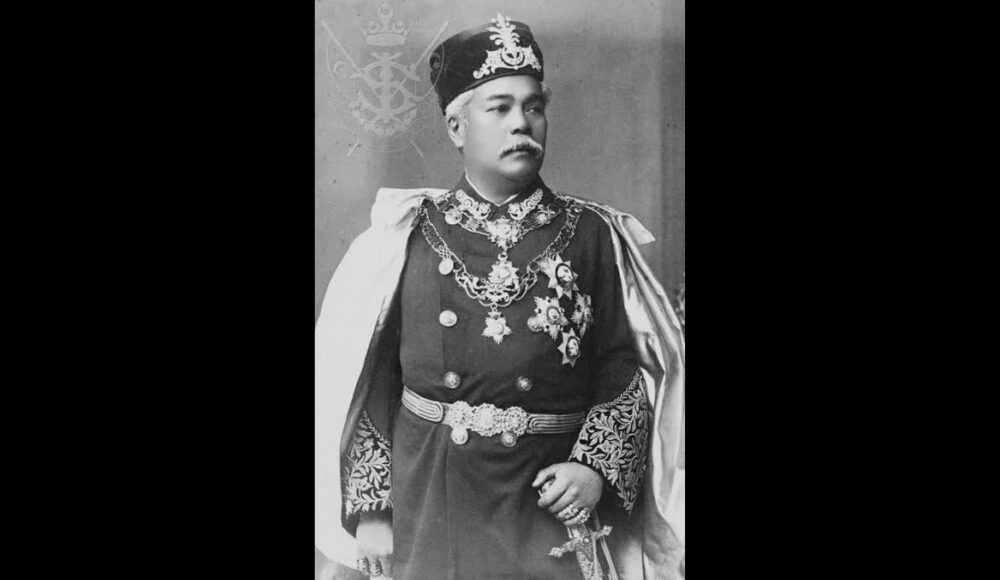MAY 11 — At a time when much of the Malay Peninsula was slipping under British influence, one ruler stood firm in defending the independence of his realm. Sultan Abu Bakar of Johor, often referred to as the Father of Modern Johor, distinguished himself as a far-sighted monarch whose mastery of diplomacy preserved the sovereignty of his kingdom when others wobbled.
By the late nineteenth century, the British had entrenched themselves in the Malay States. The Pangkor Treaty of 1874 placed Perak under the control of a British Resident, marking the beginning of formal colonial oversight. Other states, such as Selangor and Pahang, soon followed. However, Johor remained independent for much longer, maintaining a unique relationship with the British Empire without surrendering its internal governance.
This was no accident. Sultan Abu Bakar, who ruled from 1862 until his death in 1895, was a man of exceptional vision. He recognised early on that the key to preserving Johor’s sovereignty lay in presenting his state as politically orderly, administratively modern and economically progressive. To this end, he embarked on a series of administrative reforms that put Johor ahead of its time.
Sultan Abu Bakar introduced a formal constitution in 1895, making Johor the first Malay state with a codified legal framework. He established an efficient civil service, improved infrastructure, and encouraged the cultivation of cash crops such as gambier and pepper. These initiatives generated wealth and stability, allowing Johor to fund its governance without depending on colonial assistance.
Sultan Abu Bakar was the first Sultan of modern Johor, the 21st Sultan of Johor and the first Maharaja of Johor from the House of Temenggong.
Beyond internal reforms, Sultan Abu Bakar was acutely aware of the importance of managing external relations. Unlike many of his contemporaries, he built strong personal ties with senior British officials and frequently visited Europe particularly United Kingdom and France. During these travels, he impressed foreign dignitaries with his command of the English language, his understanding of international affairs, and his commitment to good governance.
His diplomatic efforts bore fruit in 1885, when the British formally recognised him as the Sultan of Johor, a title that elevated his status and gave him added legitimacy on the world stage. Crucially, this recognition came without the appointment of a British Resident in Johor, allowing him to maintain actual control over his administration.
Sultan Abu Bakar’s diplomacy was not a sign of submission, but rather a calculated effort to balance respect for foreign powers with a firm grip on domestic sovereignty. He adopted certain Western customs and institutions not to abandon his Malay identity, but to protect it. He understood that in an age of empire, projecting modernity was essential to retaining independence.
This strategic adaptability distinguished Johor from other Malay states. Where some rulers resisted British pressure only to be sidelined or overthrown, Abu Bakar engaged with the British on equal footing. He was respected as a statesman and trusted as a partner, which helped Johor maintain its autonomy longer than many of its neighbours.
The story of Sultan Abu Bakar is a reminder that the Malay world was not devoid of diplomatic skill. On the contrary, it produced leaders capable of navigating the complexities of imperial politics while safeguarding the interests of his country. His reign challenges simplistic portrayals of colonisation as an inevitable conquest of the weak by the strong. In truth, Johor remained sovereign because it was led by a ruler who understood both the value of tradition and the demands of the modern world.
As Malaysia continues to engage with rising global powers and asserts its leadership in the region through platforms like Asean, the example of Sultan Abu Bakar offers valuable lessons. Placing diplomacy anchored in wisdom and strategic foresight could be just as powerful as military resistance in defending the sovereignty of a nation.
Sultan Abu Bakar’s enduring legacy lies not only in the institutions he built but in the dignity with which he preserved Johor’s independence.
He showed that true power lies not in retreat, but in facing the world boldly while defending what is rightfully his with wisdom.
*Assoc. Prof. Mohd Hazmi Mohd Rusli is the Coordinator, International Law Unit, Faculty of Syariah and Law, at Universiti Sains Islam Malaysia and the Research Associate, Asian Institute of International Affairs and Diplomacy, at Universiti Utara Malaysia.
**This is the personal opinion of the writer or publication and does not necessarily represent the views of Malay Mail.





